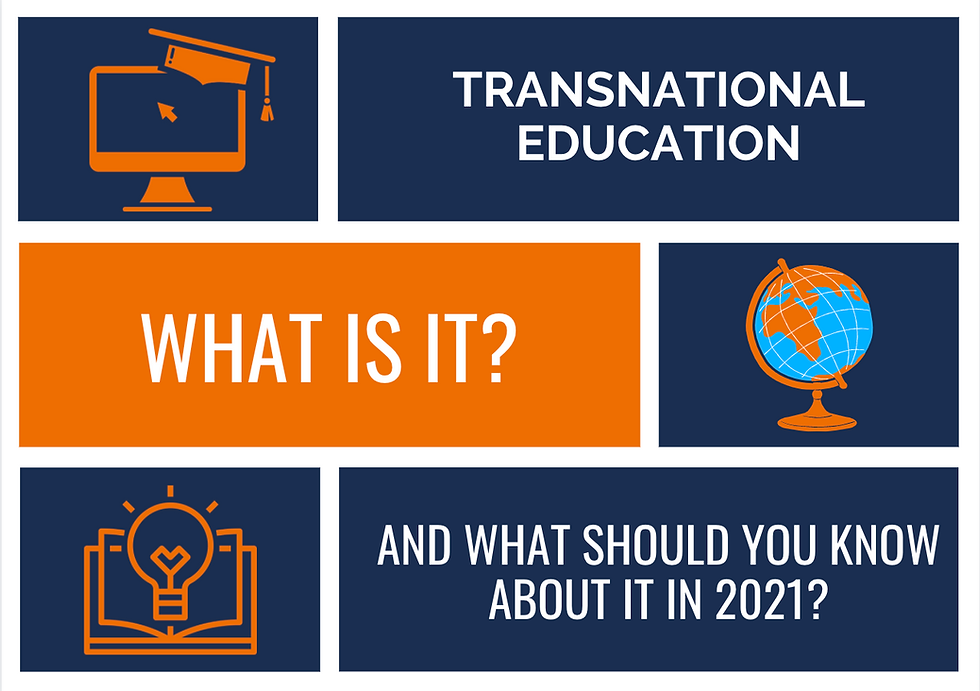TRANSNATIONAL EDUCATION: WHAT IT IS AND WHY IT MATTERS IN 2021

Restrictions on international travel have frustrated the plans of thousands of students. The industry has debated whether students will still want an international education that isn’t all that international. A year into a global pandemic, Transnational Education (TNE) has emerged as a viable option for students seeking a safe, affordable alternative to travelling abroad.
What Is TNE?
Transnational education (TNE) is education delivered in a country outside the one in which the awarding institution is based. For example, Chinese students pursuing a Canadian curriculum and degree from within China, or a foreign-domestic partnership between schools. Although these students may never set foot in Canada, they experience Canada and the Canadian education system through coursework and the presence of foreign staff.
What Does TNE Look Like?
There are multiple forms TNE can take, including:
Local partnerships such as joint and dual degrees and twinning arrangements.

A foreign school’s physical presence in a partner country (offshore or branch campuses).
Through distance/online learning.
Pathway partnerships, with students beginning their studies at home and completing their degrees abroad.
Massive Open Online Courses (MOOCs).
TNE can be delivered across all levels of study, from primary to postgraduate, in almost every field. As Chinese students consider domestic-international alternatives that maintain their academic competitive edge, quality of education is paramount; TNE programs offer students study plans tailored to their pandemic-related needs, allowing them to earn qualifications from international schools from home.
TNE In China
Many Chinese students (and parents) see TNE as a more economically viable option than traditional study abroad. Students can remain closer to home while developing their language skills and preparing to enter the workforce with different skills than their Chinese-educated peers.

Establishing TNE In China
Globally, Australia and the United Kingdom have been the biggest purveyors of TNE in China, with countries as varied as South Korea and the Netherlands working to establish a presence.
However, China’s Ministry of Education is increasingly encouraging “4+0” TNE, where programming is delivered entirely in-country, an extra barrier to entry for schools with fewer financial and staffing resources. Increased selectiveness and regulation has slowed TNE growth in China, but reflects China’s shift in prioritizing quality and depth of foreign partnerships over quantity, as evidenced by the closure of 125 TNE programs between 2006-2015, and the additional closure of 104 programs between 2016-18.
The Chinese Education Association for International Exchange (CEAIE) regulates TNE in China. Foreign institutions face minimum requirements for the curricula they must provide, foreign staffing, course delivery, and the amount of coursework to be completed from within China. TNE requires balancing multiple stakeholders and thorough knowledge of the destination country. TNE partnerships require co-operation with local government, which can raise concerns about curriculum modification or academic freedom in response to government regulation.
COVID-19: Challenges and Changes In TNE
In the wake of the pandemic, many students are seeing TNE as an attractive alternative to taking their chances on the re-opening of consulates and re-establishment of flight routes.

Although 9 in 10 international students in America during last year’s Spring semester stayed in the US - whether by choice or an inability to return home, many who did return struggled. Living and learning nocturnally, physically at home but mentally in a foreign timezone left students perpetually jet-lagged.
When the Chinese Ministry of Education allowed Chinese-foreign partnership schools to enrol students admitted to overseas partners but unable to travel, many Chinese students registered as “exchange” students on Chinese campuses. Zhejiang University played host to hundreds of Chinese students enrolled in foreign schools, and many American schools operating Chinese campuses, such as NYU, Penn State, and the University of Pittsburgh, set up similar programs.

In 2020, TNE in China saw a shift towards in-country programming. In June 2020, 205 TNE programs, 29 institutions and 113 vocational projects between China and the UK were approved. A challenge to TNE partnership programming is the struggle to bring foreign staff back into China and pandemic-related difficulties in establishing new partnerships.
The success of these programs in delivering a “normal” campus experience, especially compared with socially-distanced dorm life abroad, could prove pivotal in increasing demand for partnership TNE programming, as opposed to online, as the effects of the pandemic continue to loom.
As one student shared, ”It's a good option for those who wanted to study abroad. They can complete their study in China a similar 'western curriculum' and international environment”. Other students mentioned their satisfaction with the international-at-home experience, and have begun looking for “back up” options as they further their pursuit of an international education.
Conclusion
The desire for an internationally-focused education may not be entirely quelled by COVID. Increased exposure to TNE and the likelihood of a Chinese host school being partnered with a higher-ranked foreign one, may make TNE increasingly appealing to Chinese students, particularly as Chinese institutions return to in-person learning far ahead of many foreign ones.
Want the latest on Chinese education? Follow us here.
ABOUT EDUFAIR CHINA
eduFair China is a free online platform dedicated to international education and recruitment. Its' platform connects millions of Chinese students with first-hand information while helping institutions recruit qualified students digitally. eduFair aims to give students a more empowered, holistic approach to international education so that they can succeed during their journey abroad.
Not sure where to start? Contact us for a free consultation!
















Comments